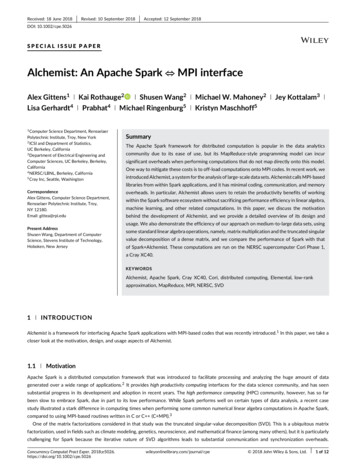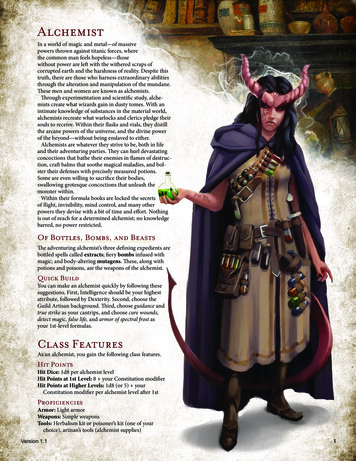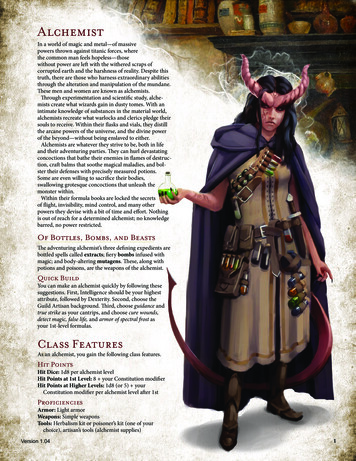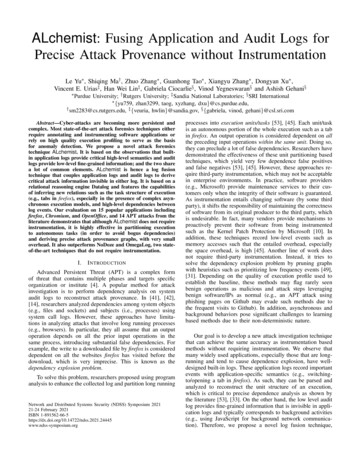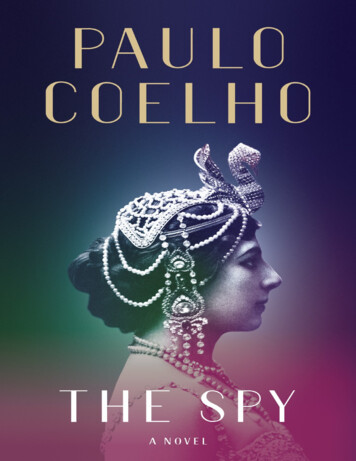
Transcription
ALSO BY PAULO COELHOThe AlchemistThe PilgrimageThe ValkyriesBy the River Piedra I Sat Down and WeptThe Fifth MountainVeronika Decides to DieWarrior of the Light: A ManualEleven MinutesThe ZahirThe Devil and Miss PrymThe Witch of PortobelloBridaThe Winner Stands AloneAlephManuscript Found in AccraAdultery
THIS IS A BORZOI BOOK PUBLISHED BY ALFRED A. KNOPFTranslation copyright 2016 by Zoë PerryAll rights reserved. Published in the United States by Alfred A. Knopf, a division of PenguinRandom House LLC, New York, and distributed in Canada by Random House of Canada, adivision of Penguin Random House Canada Limited, Toronto. Originally published in Brazilas A Espiã by Editora Paralela, a division of Editora Schwarcz S.A., São Paulo, in 2016.Copyright 2016 by Paulo Coelho. This edition published by arrangement with Sant JordiAsociados Agencia Literaria SLU, Barcelona, Spain.www.aaknopf.comKnopf, Borzoi Books, and the colophon are registered trademarks of Penguin RandomHouse LLC.Library of Congress Control Number: 201695146ISBN 9781524732066 (hardcover) ISBN 9781524732073 (ebook)ISBN 9781524711085 (open market)Ebook ISBN9781524732073This is a work of fiction although the general outline of Mata Hari’s life is based on realevents, and the author has attempted to reconstruct her life based on historical information.However, where Mata Hari or other real-life figures appear, the situations, incidents, anddialogues concerning those persons are fictional and are not intended to depict actual eventsor to change the entirely fictional nature of the work. In all other respects, any resemblanceto persons living or dead is entirely coincidental.Cover design by Stephanie RossPhotographs of Mata Hari herein are courtesy of the Collection Fries Museum, Leeuwarden,The Netherlands. Image of the letter on this page is courtesy of the National Archives,United Kingdom.v4.1ep
ContentsCoverAlso by Paulo CoelhoTitle PageCopyrightDedicationEpigraphAuthor's NoteProloguePart IPart IIPart IIIEpilogueAuthor’s Note and AcknowledgmentsA Note About the AuthorReading Group Guide
O Mary, conceived without sin, pray for us who have recourse to You. Amen.
“When thou goest with thine adversary to the magistrate,as thou art in the way, give diligence that thou mayest bedelivered from him; lest he hale thee to the judge, and thejudge deliver thee to the officer, and the officer cast theeinto prison.“I tell thee, thou shalt not depart thence, till thou hastpaid the very last mite.”—LUKE 12:58–59
Based on real events
Prologue
PARIS, OCTOBER 15, 1917—ANTON FISHERMAN AND HENRY WALES, FOR THEINTERNATIONAL NEWS SERVICEShortly before 5 a.m., a party of eighteen men—most of them officersof the French army—climbed to the second floor of Saint-Lazare, thewomen’s prison in Paris. Guided by a warder carrying a torch to lightthe lamps, they stopped in front of cell 12.Nuns were charged with looking after the prison. Sister Leonideopened the door and asked that everyone wait outside as she enteredthe cell, struck a match against the wall, and lit the lamp inside. Thenshe called one of the other sisters to help.With great affection and care, Sister Leonide draped her armaround the sleeping body. The woman struggled to waken, as thoughdisinterested in anything. According to the nun’s statement, whenshe finally awoke, it was as though she emerged from a peacefulslumber. She remained serene when she learned her appeal forclemency, made days earlier to the president of the republic, hadbeen denied. It was impossible to decipher if she felt sadness or asense of relief that everything was coming to an end.On Sister Leonide’s signal, Father Arbaux entered her cell alongwith Captain Bouchardon and her lawyer, Maître Clunet. Theprisoner handed her lawyer the long letter that she had spent theprevious week writing, as well as two manila envelopes containingnews clippings.She drew on black stockings, which seemed grotesque under thecircumstances, and stepped into a pair of high-heeled shoes adornedwith silk laces. As she rose from the bed, she reached for the hook inthe corner of her cell, where a floor-length fur coat hung, its sleevesand collar trimmed with the fur of another animal, possibly fox. Sheslipped it over the heavy silk kimono in which she had slept.Her black hair was disheveled. She brushed it carefully, thensecured it at the nape of her neck. She perched a felt hat on top of her
head and tied it under her chin with a silk ribbon, so the wind wouldnot blow it out of place when she stood in the clearing where she wasto be led.Slowly, she bent down to take a pair of black leather gloves. Then,nonchalantly, she turned to the newcomers and said in a calm voice:“I am ready.”Everyone departed the Saint-Lazare prison cell and headed towardthe automobile that waited, its engine running, to take them to thefiring squad.The car sped through the streets of the sleeping city on its way tothe Caserne de Vincennes barracks. A fort had stood there once,before being destroyed by the Germans in 1870.Twenty minutes later, the automobile stopped and its partydescended. Mata Hari was the last to exit.The soldiers were already lined up for the execution. TwelveZouaves formed the firing squad. At the end of the group stood anofficer, his sword drawn.Flanked by two nuns, Father Arbaux spoke with the condemnedwoman until a French lieutenant approached and held out a whitecloth to one of the sisters, saying:“Blindfold her eyes, please.”“Must I wear that?” asked Mata Hari, as she looked at the cloth.Maître Clunet turned to the lieutenant questioningly.“If Madame prefers not to, it is not mandatory,” replied thelieutenant.Mata Hari was neither bound nor blindfolded; she stood, gazingsteadfastly at her executioners, as the priest, the nuns, and herlawyer stepped away.The commander of the firing squad, who had been watching hismen attentively to prevent them from examining their rifles—it iscustomary to always put a blank cartridge in one, so that everyonecan claim not to have fired the deadly shot—seemed to relax. Soonthe business would be over.
“Ready!”The twelve men took a rigid stance and placed their rifles at theirshoulders.Mata Hari did not move a muscle.The officer stood where all the soldiers could see him and raisedhis sword.“Aim!”The woman before them remained impassive, showing no fear.The officer’s sword dropped, slicing through the air in an arc.“Fire!”The sun, now rising on the horizon, illuminated the flames andsmall puffs of smoke issuing from the rifles as a flurry of gunfire rangout with a bang. Immediately after this, the soldiers returned theirrifles to the ground in a rhythmic motion.For a fraction of a second, Mata Hari remained upright. She didnot die the way you see in moving pictures after people are shot. Shedid not plunge forward or backward, and she did not throw her armsup or to the side. She collapsed onto herself, her head still up, hereyes still open. One of the soldiers fainted.Then her knees buckled and her body fell to the right, legs doubledup beneath the fur coat. And there she lay, motionless, with her faceturned toward the heavens.A third officer drew his revolver from a holster strapped to hischest and, accompanied by a lieutenant, walked toward themotionless body.Bending over, he placed the muzzle of the revolver against thespy’s temple, taking care not to touch her skin. Then he pulled thetrigger, and the bullet tore through her brain. He turned to all whowere present and said in a solemn voice:“Mata Hari is dead.”
Part I
Dear Mr. Clunet,I do not know what will happen at the end of this week. I havealways been an optimistic woman, but time has left me bitter, alone,and sad.If things turn out as I hope, you will never receive this letter. I’llhave been pardoned. After all, I spent my life cultivating influentialfriends. I will hold on to the letter so that, one day, my only daughtermight read it to find out who her mother was.But if I am wrong, I have little hope that these pages, which haveconsumed my last week of life on Earth, will be kept. I have alwaysbeen a realistic woman and I know that, once a case is settled, alawyer will move on to the next one without a backward glance.I can imagine what will happen after. You will be a very busy man,having gained notoriety defending a war criminal. You will havemany people knocking at your door, begging for your services, for,even defeated, you attracted huge publicity. You will meet journalistsinterested to hear your version of events, you will dine in the city’smost expensive restaurants, and you will be looked upon withrespect and envy by your peers. You will know there was never anyconcrete evidence against me—only documents that had beentampered with—but you will never publicly admit that you allowedan innocent woman to die.Innocent? Perhaps that is not the right word. I was never innocent,not since I first set foot in this city I love so dearly. I thought I couldmanipulate those who wanted state secrets. I thought the Germans,French, English, Spanish would never be able to resist me—and yet,in the end, I was the one manipulated. The crimes I did commit, Iescaped, the greatest of which was being an emancipated andindependent woman in a world ruled by men. I was convicted ofespionage even though the only thing concrete I traded was thegossip from high-society salons.
Yes, I turned this gossip into “secrets,” because I wanted moneyand power. But all those who accuse me now know I never revealedanything new.It’s a shame no one will know this. These envelopes will inevitablyfind their way to a dusty file cabinet, full of documents from otherproceedings. Perhaps they will leave when your successor, or yoursuccessor’s successor, decides to make room and throw out old cases.By that time, my name will have been long forgotten. But I am notwriting to be remembered. I am attempting to understand thingsmyself. Why? How is it that a woman who for so many years goteverything she wanted can be condemned to death for so little?At this moment, I look back at my life and realize that memory is ariver, one that always runs backward.Memories are full of caprice, where images of things we’veexperienced are still capable of suffocating us through one smalldetail or insignificant sound. The smell of baking bread wafts up tomy cell and reminds me of the days I walked freely in the cafés. Thistears me apart more than my fear of death or the solitude in which Inow find myself.Memories bring with them a devil called melancholy—oh, crueldemon that I cannot escape. Hearing a prisoner singing, receiving asmall handful of letters from admirers who were never among thosewho brought me roses and jasmine flowers, picturing a scene fromsome city I didn’t appreciate at the time. Now it’s all I have left of thisor that country I visited.The memories always win, and with them comes a demon that iseven more terrifying than melancholy: remorse. It’s my onlycompanion in this cell, except when the sisters decide to come andchat. They do not speak about God, or condemn me for what societycalls my “sins of the flesh.” Generally, they say one or two words, andthe memories spout from my mouth, as if I wanted to go back intime, plunging into this river that runs backward.One of them asked me:
“If God gave you a second chance, would you do anythingdifferently?”I said yes, but really, I do not know. All I know is that my currentheart is a ghost town, one populated by passions, enthusiasm,loneliness, shame, pride, betrayal, and sadness. I cannot disentanglemyself from any of it, even when I feel sorry for myself and weep insilence.I am a woman who was born at the wrong time and nothing can bedone to fix this. I don’t know if the future will remember me, but if itdoes, may it never see me as a victim, but as someone who movedforward with courage, fearlessly paying the price she had to pay.
On one of my trips to Vienna I met a gentleman who had become aroaring success in Austria among men and women alike. He wascalled Freud—I can’t remember his first name—and people adoredhim because he had restored the possibility that we are all innocent.Our faults were actually those of our parents.I try to see now where mine went wrong, but I cannot blame myfamily. Adam and Antje Zelle gave me everything money could buy.They owned a hat shop and invested in oil before people knew of itsimportance, which allowed me to attend a private school, studydance, take riding lessons. When people started to accuse me ofbeing a “woman of easy virtue,” my father wrote a book in mydefense—something he should have never done. I was perfectly atease with what I was doing, and his words only drew more attentionto their accusations of prostitution and lying.Yes, I was a prostitute—if by that you mean someone who receivesfavors and jewelry in exchange for affection and pleasure. Yes, I wasa liar, one so compulsive and out of control that I often forgot whatI’d said and had to expend great mental energy to cover my blunders.I cannot blame my parents for anything, except perhaps for havinggiven birth to me in the wrong town. Leeuwarden, a place most of myfellow Dutchmen will have never even heard of, is a town whereabsolutely nothing happens and every day is the same as the last.Early on, as a teenager, I learned that I was beautiful from the waymy friends used to imitate me.In 1889, my family’s fortune changed—Adam went bankrupt andAntje fell ill, dying two years later. They did not want me to have togo through what they went through, and sent me away to school inanother city, Leiden, firm in their objective that I have the finesteducation. There I trained to become a kindergarten teacher while Iawaited the arrival of a husband who would take charge of me. Onthe day of my departure, my mother called me over and gave me apacket of seeds:
“Take this with you, Margaretha.”Margaretha—Margaretha Zelle—was my name, and I detested it.Countless girls had been given the name Margaretha because of afamous and well-respected actress.I asked what the seeds were for.“They’re tulip seeds, the symbol of our country. But, more thanthat, they represent a truth you must learn. These seeds will alwaysbe tulips, even if at the moment you cannot tell them apart fromother flowers. They will never turn into roses or sunflowers, nomatter how much they might desire to. And if they try to deny theirown existence, they will live life bitter and die.“So you must learn to follow your destiny, whatever it may be, withjoy. As flowers grow, they show off their beauty and are appreciatedby all; then, after they die, they leave their seeds so that others maycontinue God’s work.”She placed the packet of seeds in a small bag that I had watchedher stitch carefully for days despite her illness.“Flowers teach us that nothing is permanent: not their beauty, noteven the fact that they will inevitably wilt, because they will still givenew seeds. Remember this when you feel joy, pain, or sadness.Everything passes, grows old, dies, and is reborn.”How many storms must I weather before I understand this? At thetime, her words sounded hollow; I was eager to leave that suffocatingtown, with its identical days and nights. And yet today, as I writethis, I understand that my mother was also talking about herself.“Even the tallest trees are able to grow from tiny seeds like these.Remember this, and try not to rush time.”She gave me a kiss goodbye, and my father took me to the trainstation. We barely spoke on our way there.
All the men I’ve known have given me joy, jewelry, or a place insociety, and I’ve never regretted knowing them—all except the first,the school principal, who raped me when I was sixteen.He called me into his office, locked the door, then placed his handbetween my legs and began to masturbate. At first I tried to escape,saying, gently, that this wasn’t the time or place. But he said nothing.He pushed aside some papers on his desk, laid me on my stomach,and penetrated me all in one go, as if he were scared that someonemight enter the room and see us.My mother had taught me, in a conversation laden withmetaphors, that “intimacy” with a man should take place only whenthere is love, and when that love is for life. I left his office confusedand frightened, determined not to tell anyone what had happened,until another girl brought it up when we were talking in a group.From what I could tell, it had already happened to two of them, butto whom could we complain? We risked being expelled from schooland sent back home, unable to explain the reason. So we were forcedto keep quiet. My solace was knowing I wasn’t the only one. Later,when I became famous in Paris for my dance performances, thesegirls told others and, before long, all of Leiden knew what hadhappened. The principal had already retired, and no one daredconfront him. Quite the opposite! Some even envied him for havingbeen the beau of the great diva of the time.From that experience, I began to associate sex with somethingmechanical, something that had nothing to do with love.Leiden was even worse than Leeuwarden; there was the famoustraining school for kindergarten teachers, and a bunch of people whohad nothing better to do than mind other people’s business. One day,out of boredom, I began reading the classified ads in the newspaperof a neighboring town. And there it was: Rudolf MacLeod, an officerin the Dutch army of Scottish descent, currently stationed inIndonesia, seeks young bride to get married and live abroad.
There was my salvation! Officer. Indonesia. Strange seas andexotic worlds. Enough of conservative, Calvinist Holland, full ofprejudice and boredom. I answered the ad, enclosing the best andmost sensual picture I had. Little did I know that the ad had beenplaced as a joke by one of the captain’s friends. My letter would bethe last of sixteen to arrive.He came to meet me dressed as if he were going to war: in fulluniform, with a sword hanging to the left, and his long whiskerscoated in pomade, which somewhat hid his ugliness and lack ofmanners.At our first meeting, we talked about trivial matters. I prayed forhim to return, and my prayers were answered; a week later he wasback, to the envy of my girlfriends and the despair of the schoolprincipal, who possibly still dreamed of another day like the onebefore. I noticed Rudolf smelled like alcohol, but did not pay it muchmind. He was likely nervous in my presence, me a young womanwho, according to all my friends, was the most beautiful in the class.He asked me to marry him on our third and final meeting.Indonesia. Army captain. Voyages to faraway places. What morecould a young woman want from life?“You’re going to marry a man twenty-one years your senior? Doeshe know you’re no longer a virgin?” asked one of the girls who hadhad the same experience with the school principal.I didn’t answer. I returned home, he respectfully asked my familyfor my hand, and they took a loan from the neighbors for thetrousseau. We were married on July 11, 1895, three months afterreading the ad.
“Change” and “change for the better” are two very different things. Ifit weren’t for dance and for an officer named Andreas, my years inIndonesia would have been a never-ending nightmare. My worstnightmare now would be to go through it all again. A distanthusband who was always surrounded by other women, theimpossibility of running away and returning home, the lonelinessthat came from being forced to spend months indoors because Ididn’t speak the language, not to mention being constantly kept tabson by the other officers.What should have been a source of joy for any woman—the birth ofher children—would become a nightmare for me. After I recoveredfrom the pain of childbirth, my life was filled with meaning the firsttime I touched my daughter’s tiny body. Rudolf improved hisbehavior for a few months, but soon he returned to what he likedbest: his local lovers. According to him, no European woman couldcompete with an Asian woman, for whom sex was like a dance. Hetold me this without any shame, perhaps because he was drunk, orperhaps because he deliberately wanted to humiliate me. Later,Andreas shared that, one night when the two of them were on ameaningless expedition from nothingness to nowhere, Rudolf said ina moment of alcoholic candor:“I’m afraid of Margaretha. Have you noticed how the other officerslook at her? She could leave me at any moment.”It was this sick logic, one that turns men afraid of losing someoneinto monsters, that made him grow even worse. He called me awhore because I wasn’t a virgin when I met him. He wanted to knowthe details of every man he imagined I’d once had. Sobbing, I toldhim the story of the principal in his office. Sometimes he’d beat me,saying I was lying, and other times he masturbated and demandedmore details. Given that it had been a nightmare for me, I was forcedto invent these, not quite understanding why I was doing it.
He went so far as to send a servant with me to buy something thatlooked like the school uniform I’d worn when he met me. Wheneverhe was possessed by some unknown demon, he’d order me to wear it.He took the most pleasure from reenacting the rape scene; he wouldlay me down on the desk and penetrate me violently as I cried out, soall the servants could hear and assume that I loved it.Sometimes I had to behave like a good little girl, who endured therape; other times he made me scream for him to be more violent, likeI was a whore and liked it.Gradually I lost sight of who I was. My days were spent caring formy daughter, shuffling about the house with a vacant look on myface. I concealed the scratches and bruises under extra makeup, but Iknew I wasn’t fooling anyone.I fell pregnant again. I enjoyed a few days of immense happinesscaring for my son, but he was soon poisoned by one of his nannies,who never even had the opportunity to explain her actions; the otherservants killed her the same day the baby was found dead. In theend, most said it was deserved retaliation, as the nanny had beenconstantly beaten, raped, and burdened by endless working hours.
Now I had only my daughter, a house that was always empty, ahusband who never took me anywhere for fear of being betrayed, anda city so beautiful it felt oppressive; here I was in paradise, living myown personal hell.Then one day, everything changed. The regiment commanderinvited the officers and their wives to a local dance performancemeant to honor one of the island’s rulers. Rudolf could never say noto a superior. He asked me to buy something expensive and sensualto wear. I understood the reason for “expensive,” which spoke moreto his possessions than my own personal endowments. But if—as Ilearned later—he was so afraid of me, why would he want me to dresssensually?We arrived at the venue. The women looked at me with envy, themen with desire, and I noticed that that excited Rudolf. It looked likethe evening would end badly, with me being forced to describe what Ihad “imagined doing” with each of the officers as Rudolf penetratedand beat me. By any means possible, I had to protect the only thing Ihad left: myself. And the only way I was able to do that was bystriking up a long conversation with Andreas, whose wife watchedme with terror and amazement. I kept my husband’s glass full,hoping he would fall over drunk.I would like to finish writing about Java here, this instant; whenthe past dredges up a memory capable of opening old wounds,suddenly other wounds appear and make the soul bleed more deeply,until you have to kneel down and cry. But I cannot stop until I bringup the three things that would change my life: my decision, the dancewe watched, and Andreas.My decision: I could no longer accumulate problems and live so farbeyond the limits of human suffering.As I thought about this, the group that was preparing to dance forthe local ruler began to take the stage, nine people in total. Instead ofthe frenetic, joyful, and expressive rhythms I had seen on my few
visits to the city’s theaters, everything seemed to happen in slowmotion. At first I was bored to death, but was then overtaken by akind of religious trance, as the dancers let themselves get carriedaway by the music and assumed impossible poses. In one, theirbodies bent forward and backward, forming an extremely painful S;they remained there until, suddenly, they’d snap out of their stillnesslike leopards ready to ambush.They were all painted blue and dressed in sarongs, the typical localattire. Across their chests, they wore a silk ribbon meant toemphasize the men’s muscles and cover the women’s breasts. Thewomen, in turn, wore handcrafted tiaras decorated with preciousstones. Moments of tenderness alternated with imitations of battles,where the silk ribbons served as imaginary swords.I grew increasingly entranced. For the first time I understood thatRudolf, Holland, my slain son, all of these things were part of a worldthat had died and was being reborn, like the seeds my mother hadgiven me. I looked to the sky and saw the stars and the palm leaves. Iwas ready to let myself be swept away to another dimension andanother space when Andreas’s voice interrupted:“Do you understand everything?”I thought I must, because my heart had stopped bleeding and wasnow beholding beauty in its purest form. Men, however, always needto explain something, and he told me this kind of ballet came froman ancient Indian tradition that combined yoga and meditation. Hefailed to understand that dance is a poem, one where each movementrepresents a word.With my mental yoga and my spontaneous meditation interrupted,I found myself obliged to engage in any kind of conversation so asnot to appear impolite.Andreas’s wife was watching him. Andreas was watching me.Rudolf was watching me, Andreas, and one of the leader’s femaleguests, who returned his courtesy with a smile.We talked for a while, despite the dirty looks coming from theJavanese because none of the foreigners were respecting their sacred
ritual. Perhaps that is why the show came to a close earlier thanexpected, with all the dancers filing out in a procession, eyes fixed ontheir fellow countrymen. None of them looked at the whitebarbarians with their well-dressed wives, their raucous laughter,their Vaseline-coated beards and mustaches, and their terriblemanners.After I filled his glass once more, Rudolf walked toward theJavanese woman who had smiled, and she looked at him without anyfear or intimidation. Andreas’s wife came over, grabbed his arm,smiled in a way that said “He’s mine,” and pretended to be mostinterested in her husband’s pointless commentary about the dance.“All these years I have been faithful to you,” she said, suddenlyinterrupting the conversation.“You are the one who commands my heart and my actions, and,God is my witness, every night I ask for you to return home safe andsound. If I had to give my life for yours, I would do it without anyfear.”Turning to me, Andreas excused himself and said he had to leave,that the ceremony had been very tiring for everyone. But his wifesaid she would not budge; she said it with such authority that herhusband did not dare make another move.“I waited patiently for you to understand that you are the mostimportant thing in my life. I followed you to this place. Whilebeautiful, it must be a nightmare for all the wives, includingMargaretha.”She turned to me then, her big blue eyes pleading for myagreement, for me to follow in that ancient tradition women had ofalways being one another’s enemy and accomplice. But I didn’t havethe courage to nod.“I fought for our love with all my might, but today it’s run out. Thestone that weighed on my heart is now a rock that will no longer let itbeat. And my heart, with its last breath, told me there are otherworlds beyond this one, worlds where I don’t have to always beg forthe company of a man to fill these empty days and nights.”
Something told me that tragedy was coming. I asked her to calmdown; she was very dear to everyone in that group, and her husbandwas a model officer. She shook her head and smiled, as if she’dalready heard it many times. And she continued:“My body can keep breathing, but my soul is dead. I cannot leavehere, nor can I make you understand I need you by my side.”Andreas, an officer of the Dutch army with a reputation topreserve, was visibly uncomfortable. I turned and began to walkaway, but she dropped her husband’s arm and held on to mine.“Only love can give meaning to something that, on its own, hasnone at all. It turns out I don’t have that love. So what reason is thereto go on living?”Her face was right next to mine; I tried to smell for alcohol on herbreath, but there was none. I looked in her eyes and also saw notears. Perhaps they had all dried.“Please, I need you to stay, Margaretha. You are a good woman,one who lost a child. Though I’ve never been pregnant, I know whatthat means. I’m not doing this for me, but for all those women whoare prisoners in their alleged freedom.”Before any of us had time to stop her, Andreas’s wife slid a smallpistol from her purse, pointed it to her own heart, and fired. Thoughmuch of the noise had been absorbed by her evening gown, peopleturned our way. At first they must have thought I had committed thecrime, as, seconds earlier, she was clinging to me. But soon they sawthe look of horror on my face and Andreas kneeling, trying to stanchthe blood carrying away his wife’s life. She died in his arms, her eyesdisplaying nothing but peace. Everyone drew near, including Rudolf,the Javanese woman having taken off in the opposite direction,afraid of what might happen with so many armed and drunken men.Before people began to ask what had happened, I asked my husbandif we could leave right away; he agreed without saying a word.When we got home, I went straight to my bedroom and began topack my clothes. Rudolf f
The Alchemist The Pilgrimage The Valkyries By the River Piedra I Sat Down and Wept The Fifth Mountain Veronika Decides to Die Warrior of the Light: A Manual Eleven Minutes . French, English, Spanish would never be able to resist me—and yet, in t he e nd, I was the one manipulated. The crimes I did commit, I escaped, the greatest of which .



